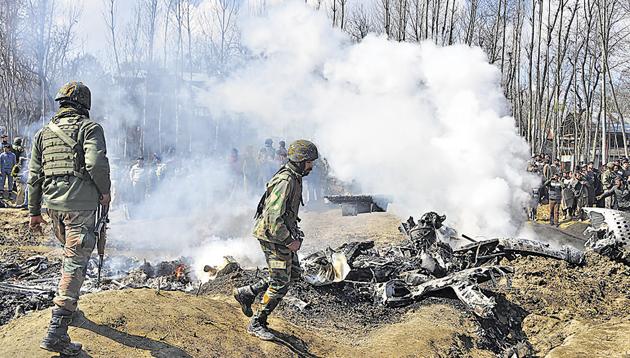Stop reducing war to a spectacle | Rajdeep Sardesai
In the real world, long-term strategic goals must not be confused with temporary election advantage: news channels can look for Television Rating Points, a responsible government can’t take a “war for votes” more cavalier approach to national security
War is not a cricket match and a remarkably daring cross-LoC air strike should not be reduced to a political spectacle. But we are in election season which might explain the well-choreographed celebratory note struck in the aftermath of the pre-emptive, non-military strike on the Balakot terror camp in Pakistan. As the collective conscience of a nation craves for avenging the brutal killing of 40 CRPF soldiers in Pulwama, the dominant national mood leads one to ask: Have Pulwama and Pakistan become the core narrative that will influence voter behaviour in the 2019 general elections?

In the week leading up to Pulwama, battle lines were drawn in more predictable terms. While the Bharatiya Janata Party (BJP) leadership spoke of a majboot sarkar (strong government) versus a maha-milawat (hotchpotch) coalition, the opposition was focused on the alleged failed promises of the Modi government, from jobs to agrarian distress. Now, in the aftermath of the air strikes, the BJP’s political managers are seeking to shape the election around the more emotive theme of muscular nationalism and Modi’s strongman image as a leader who has shown the political will to teach the enemy a lesson. The implicit message is that a vote against the BJP is no longer just a vote against Modi but also a vote for anti-national forces.
With a jingoistic television media rooting for war and a large army of cheerleaders on social media as staunch allies, there has been a concerted campaign to create an environment in which anyone who questions the government is immediately branded an anti-national. Then be it the glaring intelligence lapses in Pulwama, the lack of direction in Kashmir and ad hoc Pakistan policy, the government has sought to cover up its failings under the guise of the need for a unified national response to a snowballing crisis. The frenzied response has stretched to ludicrous extremes at times with even the patriotism of cricketing legends like Sunil Gavaskar and Sachin Tendulkar being questioned because they don’t endorse a boycott of the Pakistan cricket team at the forthcoming World Cup.
This is not the first time that the BJP has attempted to equate the party and its leadership with the credo of Hindu nationalism. A similar stratagem was also used when Modi spearheaded the BJP’s controversial 2002 Gujarat campaign. The burning to death of kar sewaks in a train compartment in Godhra had been the trigger for revenge attacks. The identification of the train saboteurs, not just with local Muslims but with neighbouring Pakistan, aroused sub-nationalistic passions under the guise of Gujarati pride or asmita. The ensuing fury ensured a two-third majority victory for the BJP in the elections that followed.
Will this model of the 2002 elections now be replicated on a national scale in the 2019 elections? By drawing a link between Kashmiri Muslims, Pakistan-based jihadi groups like the Jaish-e-Mohammed and their patrons in the Pakistani army, a scary narrative is being woven of a nation at risk from internal and external enemies. This frightening imagery was deliberately created when Amit Shah warned a political rally in Assam’s communally sensitive Lakhimpur district that the BJP would not let the state become Kashmir.
Until now, neither Kashmir nor Pakistan has ever been a central issue in an Indian general election, not even the 1999 elections, which a Atal Bihari Vajpayee-led BJP won in the immediate aftermath of the Kargil war triumph. A warlike atmosphere does unify the nation and create a sense of national purpose. In north India, especially Uttar Pradesh, where there are more raw and enduring wounds of a bloodied partition, any political consolidation over firm action against Pakistan could give the ruling party a decisive boost.
However, an escalating conflict between nuclear neighbours is a highly risky proposition, and for all the josh (energy) a film like Uri might generate in a cinema, ground realities demand a more cautious approach. No political party or leader, howsoever determined, can easily deal with the prospect of body bags coming home. Which is why the government needs to tread carefully in the weeks ahead as the election temperature rises. In TV studios, war gaming options can be discussed with a casualness that betrays lack of knowledge and sensitivity. In the real world, long-term strategic goals must not be confused with temporary election advantage: news channels can look for Television Rating Points, a responsible government can’t take a war for votes approach to national security.
Post-script: Last week, in a TV show at a leading Chennai college, the students I polled were emphatic that war with Pakistan was not an option they favoured. Neither did they want a break in sporting ties. Yes, all of us patriotic Indians are justifiably angry at Pakistan’s refusal to turn off the terror tap and are proud of the professionalism shown by our armed forces. But let’s not allow government responses to be fashioned by war echoes of a Delhi-centric manic news cycle.
Rajdeep Sardesai is a senior journalist and author
The views expressed are personal






